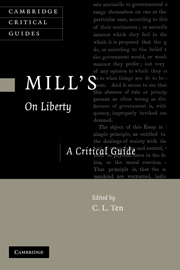Book contents
- Frontmatter
- Contents
- List of contributors
- Mill's On Liberty: Introduction
- 1 Mill's case for liberty
- 2 Mill's liberal principles and freedom of expression
- 3 Racism, blasphemy, and free speech
- 4 State neutrality and controversial values in On Liberty
- 5 Rawls's critique of On Liberty
- 6 Mill on consensual domination
- 7 Autonomy, tradition, and the enforcement of morality
- 8 Mill and multiculturalism
- 9 Mill, liberty, and (genetic) “experiments in living”
- 10 John Stuart Mill, Ronald Dworkin, and paternalism
- Bibliography
- Index
3 - Racism, blasphemy, and free speech
Published online by Cambridge University Press: 01 July 2009
- Frontmatter
- Contents
- List of contributors
- Mill's On Liberty: Introduction
- 1 Mill's case for liberty
- 2 Mill's liberal principles and freedom of expression
- 3 Racism, blasphemy, and free speech
- 4 State neutrality and controversial values in On Liberty
- 5 Rawls's critique of On Liberty
- 6 Mill on consensual domination
- 7 Autonomy, tradition, and the enforcement of morality
- 8 Mill and multiculturalism
- 9 Mill, liberty, and (genetic) “experiments in living”
- 10 John Stuart Mill, Ronald Dworkin, and paternalism
- Bibliography
- Index
Summary
INTRODUCTION
J. S. Mill evidently accepts that society and government may legitimately use coercive measures to prevent individuals from behaving in ways that pose a risk of direct and immediate harm to other people without their genuine consent and participation. The most important thing a society can do to promote the general welfare, he makes clear in the fifth chapter of Utilitarianism, is to establish laws and customs that distribute weighty equal rights not to suffer unprovoked violence, undue discrimination, and other grievous harms. These rules of justice might sanction unusually harsh punishment for wrongdoers – whether members of the popular majority or a minority – who make a show of harming others merely because the others are perceived as belonging to alien races, religions, or ethnic backgrounds.
But Mill also gives the impression that he draws a sharp distinction between actions and speech. In the second chapter of On Liberty, he argues that mature individuals – people capable of rational persuasion, which excludes children and delirious, insane, or otherwise incompetent adults – ought to be absolutely free to form and discuss any opinions they wish: “there ought to exist the fullest liberty of professing and discussing, as a matter of ethical conviction, any doctrine, however immoral it may be considered” (CW XVIII, 228n. [11, 1n.]). He “altogether condemn[s]” even the practice of referring to “the immorality or impiety of an opinion” as such (CW XVIII, 234 [11, 11]).
- Type
- Chapter
- Information
- Mill's On LibertyA Critical Guide, pp. 62 - 82Publisher: Cambridge University PressPrint publication year: 2009
- 3
- Cited by



